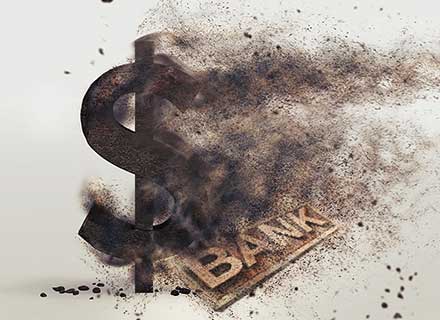There is now a global banking crisis. The probable next stage is a potential global credit crunch, which may trigger another global financial catastrophe. Nevertheless, stakeholders are trying to prevent another 2007-08 like situation.
When Silicon Valley Bank could not meet its clients’ deposit demands in the second week of March, we saw a traditional bank fail. Next came New York’s Signature Bank, thus forcing the Federal Reserve and the Joe Biden government to hurry to stop the emergence of a nationwide bank crisis. Financial institutions have been given access to liquidity, and customers have been repeatedly assured that their savings are secure.
These hasty responses have given indication to the world that the US government was unprepared for such a crisis situation and is now working feverishly to prevent any further hints of financial contagion. The fear is still palpable in the world financial markets.
The bond market panicked as the share price of the world’s largest investment bank, Credit Suisse, plummeted overnight. To make matters worse, the iconic bank has been taken over by its Swiss rival UBS for a deal worth USD 3.25 billion.
What happens next is the crucial question. You have trouble brewing in another American financial institution, First Republic Bank, whose shares have crashed by over 46% and it needs to raise more funds despite a USD 30 billion rescue by the US authorities.
The Credit Suisse Catastrophe
Now-defunct Credit Suisse’s credit default swaps saw a sharp price increase in 2017.
Simply put the increased possibility that the investment bank wouldn’t be able to pay off all of its loans and its ability to fund itself worried the financial markets. In addition to the numerous scandals the bank had experienced, its profitability and the future of its investment banking section were also under scrutiny.
Since several years ago, its share prices had been steadily declining. By March 2020, it had dropped from 16.49 CHF in 2018 to 6.66 CHF. The stock price did well throughout the COVID period, but it dropped significantly once more in March 2021.
Time travel to September 2022, when the company’s credit default swaps spiked and its stock price plummeted sharply, and the CEO was required to reassure the market that the firm’s capital base, or cash buffers, was strong.
The second-largest bank in Switzerland, however, was facing a “difficult moment,” according to the CEO’s statement in early 2023. The share price had declined over the last six months while investors withdrew their funds from the company.
Notably, the Saudi National Bank, which owns 9.88% of Credit Suisse, decided against purchasing additional shares due to regulatory reasons. Saudi National Bank also stated that while it believed the company to be in a good position, it needed more resources to support commercial growth.
Given how tense market players had been, the timing of the Saudi bank’s remarks was terrible for the global financial system. Bond traders, in particular, tended to act hastily and ask questions later.
Bond Market Turbulence
Undoubtedly, the price changes in the bond markets over the past week were extraordinary.
Bond investor Angus Coote said, “These moves in the bond market are mind-blowing. A week ago, the yield on two-year Treasuries (US government bonds) was over 5%. They are currently at 3.88%”.
Again, this indicates that traders in the money market around the world have recently been fervently purchasing government bonds. Why? Because they are considered reasonably safe assets in volatile times.
It also makes sense because the government backs the investments issuing them. Bond prices decrease when interest rates go up and vice versa. A declining bond market indicates that interest rates increase to bring down the economy’s temperature.
The opposite is also true: when bond prices rise, interest rates fall, indicating a massive financial storm is on the horizon that will force central banks to stop raising rates and start slashing them.
Not The Great Financial Crisis 2.0
The logical follow-up query is what this storm might look like. However, what we’re witnessing isn’t a continuation of the great financial crisis that began in 2008. Back then, “the world’s largest banks were discovered to be swimming nude when the tide ran out,” as Warren Buffett memorably said.
The world’s largest investment banks are now classified as being “too big to fail” under a new regulatory framework that was put in place as a direct result of that financial crisis. As a result, they must maintain sizable cash reserves or other forms of safety to survive another financial crisis.
However, former United States President Donald Trump ensured that thousands of mid-tier regional American banks were exempt from these regulations.
This means that Silicon Valley Bank had unrestricted access to invest billions of dollars of its deposits in US Treasury securities without any “insurance” to safeguard client funds if the markets turned against the bank.
The banks did just that, as it turned out. The value of Silicon Valley Bank’s investment decreased when interest rates increased. When hundreds of small software companies went to the bank to withdraw money when interest rates were also climbing, it became an issue.
Silicon Valley Bank had to sell its investments at a significant loss to meet customer needs. It caused alarm that the bank couldn’t keep up with client requests, and a bank run followed. Yet, once more, the regulatory response was prompt. The regulators forced the bank to close its doors to assuage consumers’ worries.
The idea was to create a fund for paying out deposits funded by the banking system. Janet Yellen, the secretary of the Treasury, stressed that it wasn’t a taxpayer bailout. Yet, from where will banks be able to replenish this fund? Their clients. The crucial question, therefore, becomes: When do regulators stop assisting financial institutions in need?
If the response is “never,” then we have entered a new era of capitalism. If the answer is when they determine it will be too expensive for them, then the 2007-08 like scenario is not far off.

